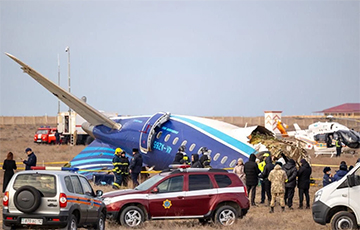How The Downed Plane Affects Relations Between Russia And Azerbaijan
5- Andreas Umland
- 30.12.2024, 15:42
- 6,568

The Kremlin's excuses in 2024 began as absurdly as in 2014.
Rather, Russia will not be able to benefit politically from the downing of the passenger plane. Since it was a passenger aircraft of a third country, Azerbaijan, which is not directly related to the Russian-Ukrainian war. Probably, the incident occurred at an inconvenient time for the Kremlin, as Russian-Azerbaijani relations have improved in recent years. The shelling of the Azerbaijani aircraft and, in particular, the irresponsible refusal to allow the damaged aircraft to make an emergency landing on the territory of Russia can now worsen these relations.
This incident resembles the downing of MH17 in 2014, although at first glance there are many differences, but there are also some structural and contextual similarities. Three are singled out.
First, as in the case of the 2014 crash over eastern Ukraine, it appears that a heavy and high-flying anti-aircraft missile was used in the area where passenger planes fly. Already in 2014, it was surprising that the Russian army was willing to risk the mass murder of uninvolved civilians in order to achieve its military goals in Ukraine. Now the ruthlessness of the Kremlin has been demonstrated once again.
Secondly, in addition to general negligence, irresponsibility towards non-Russian citizens and airlines is again manifested, which — like in 2014, Malaysian Airlines and their passengers — are forced to bear collateral damage from the ruthless Russian war. In 2024, Russia's refusal to allow an emergency landing of a damaged foreign aircraft makes this recklessness even more obvious.
Thirdly, the Kremlin's excuses in 2024 began as absurdly as in 2014. If 10 years ago Ukrainians were blamed for the shooting down of an aircraft flying at high altitude over the de facto Russian-controlled part of the Donets basin, then in 2024 the culprit of the accident was first called a "bird strike" — and, accordingly, the Azerbaijani airline itself. Only a few days after the public tough stance of the President of Azerbaijan, Vladimir Putin called Ilham Aliyev and “apologized for the tragic incident with the aircraft in Russian airspace,” mentioning that “Russian air defences repelled UAV attacks.”
The question remains: How does the downed plane affect relations between Russia and Azerbaijan? After all, over the past four years, Russia has more or less betrayed its official ally in the South Caucasus — Armenia. Moscow left Yerevan to its fate during the escalation of the Armenian-Azerbaijani conflict over the disputed territory of Nagorno-Karabakh and instead deepened its relations with Baku. In some respects, the hereditary dictatorship of the Aliyev family in Azerbaijan resembles the overthrown Syrian regime of Hafiz and Bashar al-Assad. Under such autocratic systems of government, it is difficult to predict how much these attacks and the astonishing denial of an emergency plane landing will strain relations between Moscow and Baku.
The incident is likely to have only some repercussions for air connectivity to and within Russia, but no major political implications. One can only hope that Russia's shocking behavior towards the Azerbaijani passenger plane in 2024 will help to illustrate Russia's methods of warfare for people around the world.
In 2014, Moscow managed to cast doubt on its responsibility for the downing of MH17. Many still cannot understand who was really to blame for what happened on July 17, 2014. Russia's psychological warfare against MH17 even reached a competent Dutch court, which surprisingly found that several anti-Ukrainian irregular fighters in the Donbas, not the Russian army and its Commander-in-Chief Vladimir Putin, were responsible for the use of the very complex and expensive BUK-Telar missile system that shot down MH17. To date, much journalistic, legal and scientific work remains to be done to deal with the tragic and politically significant incident with MH17 in 2014.
Andreas Umland, New Voice











